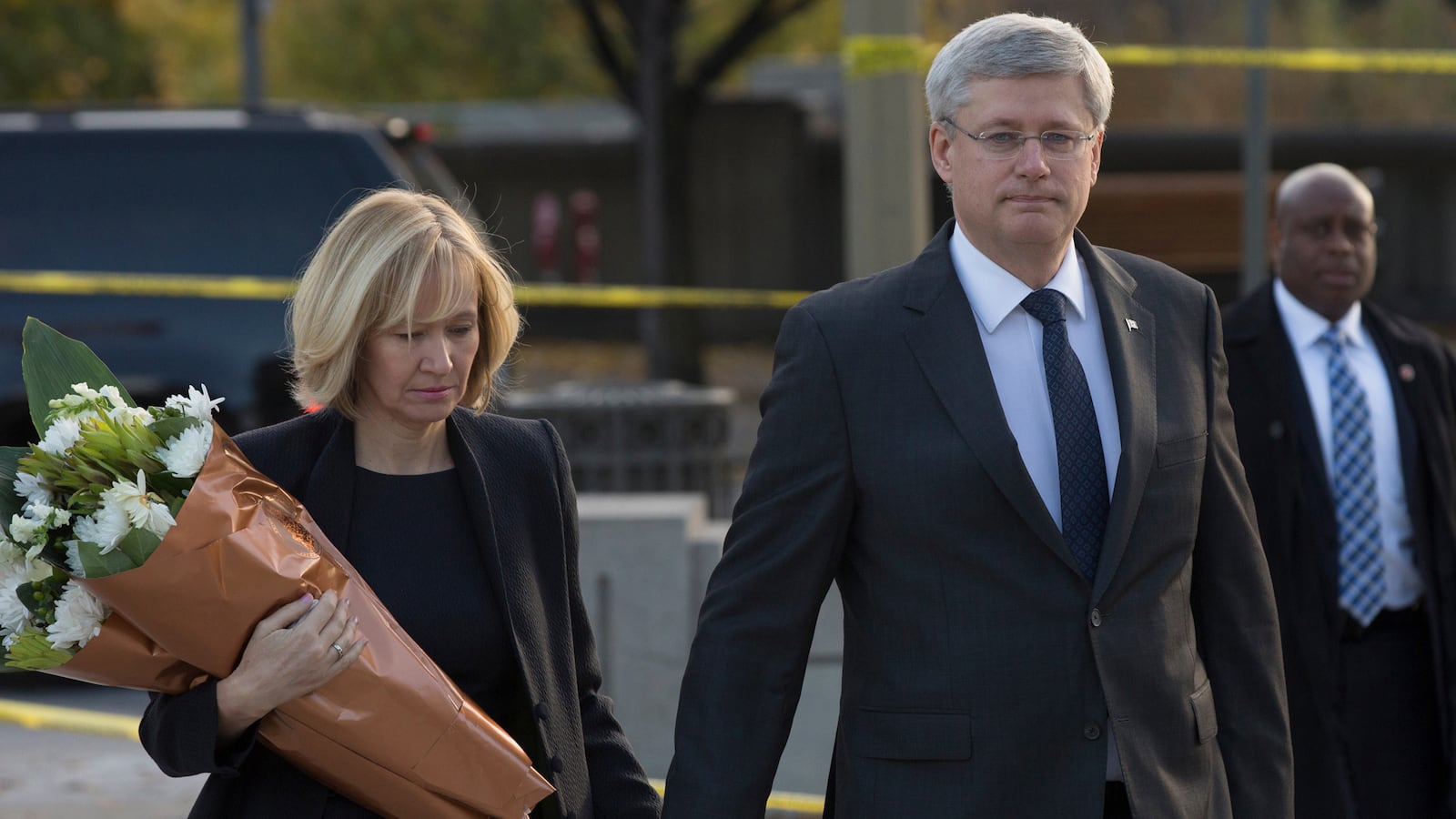The shocking terrorist attack in Ottawa on Wednesday yielded quickly to political sniping in the United States, as tragedies often do. What the sniping revealed, however, is the American right’s rising esteem for Canadian Prime Minister Stephen Harper, the leader of the ruling Conservative Party.
U.S. conservatives were quick to criticize President Barack Obama for not immediately identifying the Ottawa shooting as terrorism (In fact, Obama did condemn the incident as “senseless violence or terrorism” and stressed the need for the two countries to collaborate closely on “terrorist activity”).
Newt Gingrich wrote online that the president’s statement “verges on the delusional. He can’t bring himself go tell truth [sic] about Radical Islamists.” An American Spectator headline blared: “Obama equivocates.”
Conservatives have also long taken issue with the Obama administration’s description of the 2009 Fort Hood shooting, which the government has classified as “workplace violence.”
“How long will it take for Barack Hussein Obama to declare the Ottawa shooting as an act of terrorism? Or will it just be another example of ‘workplace violence?’” wrote former Rep. Allen West.
The American right’s tonic for this ailment? The Canadian prime minister.
Citing Harper’s address to the nation Wednesday, in which he called the shooter a “terrorist” and said terrorist organizations would “have no safe haven,” conservatives flocked in droves to pay homage.
“It’s why it was kind of refreshing to hear Stephen Harper define this for what it was, why it happened, and who committed it,” conservative talk radio giant Rush Limbaugh said Thursday. “It will not happen at the upper levels, the upper tiers of our leadership.”
“I’m very encouraged to hear Prime Minister Harper really speak the truth,” cheered Rep. Ron DeSantis, a Republican from Florida, to Fox News.
Harper, 55, is in his third term as prime minister. Unlike Obama, he’s not known for soaring oratory—instead he’s known as a brainy intellectual. He holds an undergraduate and master’s degree in economics, granted from the University of Calgary in Alberta, and his background includes stints in the petroleum industry and at a taxpayers’ watchdog. He first rose to the position of prime minister in 2006, as head of a minority government. In 2008, he expanded the Conservative Party’s dominance in the House of Commons, before winning a majority government in 2011.
In a profile of Harper for the conservative National Review, writer Jay Nordlinger reserved high praise for the prime minister: “Conservatives, wherever they live, can be pleased with Stephen Harper. He is a leader of the West, an advocate of freedom, democracy, capitalism, human rights—Western civilization, we could say.”
In 2009, said Weekly Standard Executive Editor Fred Barnes, conservative elites gathered at a dinner hosted by the Canadian-born writer David Frum, featuring Harper. Participants included conservative figures Peggy Noonan, Charles Krauthammer, and Bill Kristol.
Barnes has written about Harper since, opining in 2011 that Harper was “the most powerful conservative leader in the Americas, north and south.”
“If Stephen Harper were a Republican in the United States, he’d be at the top of his party, no question about that. He’s the top conservative leader in the world,” Barnes told The Daily Beast. “He’s not an exciting, but a very likable person, at least I found him so… He’s a real conservative.”
Barnes and Harper talked deeply about hockey, a subject that the prime minister has written a book about.
“I was really impressed by him,” Barnes said. “He compares very, very favorably to conservative Republican leaders.”
On the issues prominent enough to generate American interest—his views on Israel, terrorism in the Middle East, Keystone XL, and fiscal policy—positive reviews have come in. Harper is outspoken in his support for Israel, Canada is expected to produce a budget surplus by 2015, and he has shown staunch support for the Keystone pipeline project.
“One of the things that is great about Canada, and Harper is a central figure in this, is the willingness to exploit the natural resources there, oil being a major one, in making lives better,” Barnes told the Beast.
But the fact that American conservatives like Harper is not proof the prime minister is some ultra-right-wing hack. He hasn’t made a point of stressing social-conservative issues. Harper may disappoint the Canadian left, who before his ascendance enjoyed 13 years of Liberal Party rule, but he is no radical—fundamentally, he’s a conservative incrementalist.
With an economist background and a technocratic demeanor, Harper would disappoint the U.S. right if the backdrop of President Obama were removed. In the American context, he probably most closely resembles Bobby Jindal or Rob Portman— two Republicans not especially known for stirring up the base.
A recent Globe and Mail article laid out all the ways the American right might not like Harper: Defense spending has fallen as a percentage of GDP; his government bailed out GM and Chrysler; and he’s maintained a number of regional and industrial development funds that conservatives dislike.






